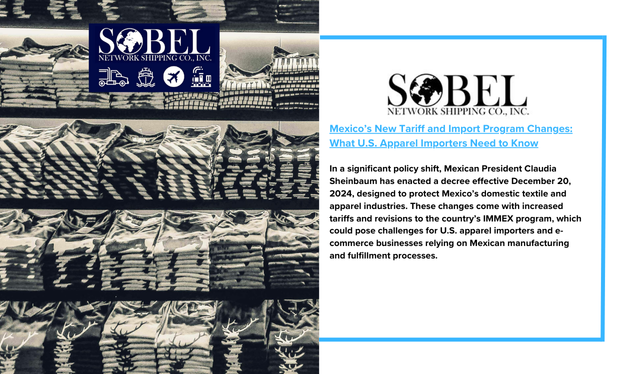In a significant policy shift, Mexican President Claudia Sheinbaum has enacted a decree effective December 20, 2024, designed to protect Mexico’s domestic textile and apparel industries. These changes come with increased tariffs and revisions to the country’s IMMEX program, which could pose challenges for U.S. apparel importers and e-commerce businesses relying on Mexican manufacturing and fulfillment processes.
The Impact of Increased Tariffs
One of the most impactful changes is the increase in import duties on key textile and apparel products. The new tariffs include:
- A rise from 20-25% to 35% on 121 apparel products and 17 made-up textiles in Chapters 63 and 94 of the Harmonized Tariff Schedule (HTS).
- An increase from 10% to 15% on 17 textile-related tariff headings.
These changes aim to create a more competitive environment for Mexican industries facing lower-cost imports from countries without free trade agreements with Mexico. The higher tariffs will remain in effect until April 23, 2026.
Revisions to the IMMEX Program
The IMMEX program has long been a cornerstone for companies deferring duties on raw materials and components used in goods destined for export. Many U.S. e-commerce businesses leverage IMMEX to avoid duties on items imported into Mexico and then exported to the United States. However, the new decree introduces critical restrictions:
- Finished clothing and textile articles under HTS Chapters 61, 62, and 63 are no longer eligible for temporary importation under IMMEX.
- Quilts, comforters (HTS subheading 9404.40), and bedding materials like pillows and cushions (HTS subheading 9404.90) are now excluded.
Despite these restrictions, specific items such as garment parts (HTS subheadings 6117.90 and 6217.90) and household linens (HTS subheadings 6302.91, 6302.93, and 6302.99) remain eligible under IMMEX. Additionally, yarns and fabrics classified in HTS Chapters 50-60 are unaffected by the decree.
The decree also expands Annex I of the IMMEX program, adding prohibited HTS headings and subheadings. Furthermore, 302 HTS items from Chapters 61, 62, and 63 have been removed from Annex II, which lists tariff lines eligible for temporary importation under specific conditions.
Categories of Goods Affected
The decree significantly impacts the following categories of goods:
Clothing (HTS Chapters 61 and 62):
- Coats, suits, jackets, pants, dresses, shirts, and sweaters
- Textile accessories such as gloves, belts, and ties
Made-Up Textile Articles (HTS Chapter 63):
- Home goods, including bed linens, blankets, pillowcases, curtains, towels, and more
- Tents, awnings, needlecrafts, and rags
Implications for U.S. Apparel Importers
These changes represent a pivotal moment for U.S. companies relying on Mexican manufacturing and supply chains. Importers may need to reassess their sourcing strategies, adjust supply chains, and explore alternative solutions to manage the increased costs and regulatory hurdles.
Staying compliant with these new regulations is essential. Businesses are encouraged to consult with trade experts and evaluate their operations to mitigate disruptions and maintain competitiveness in the evolving trade environment.
For more information on navigating these changes, contact Sobel Net. Our team is here to provide insights and strategies to ensure your business adapts to the latest developments in international trade.


